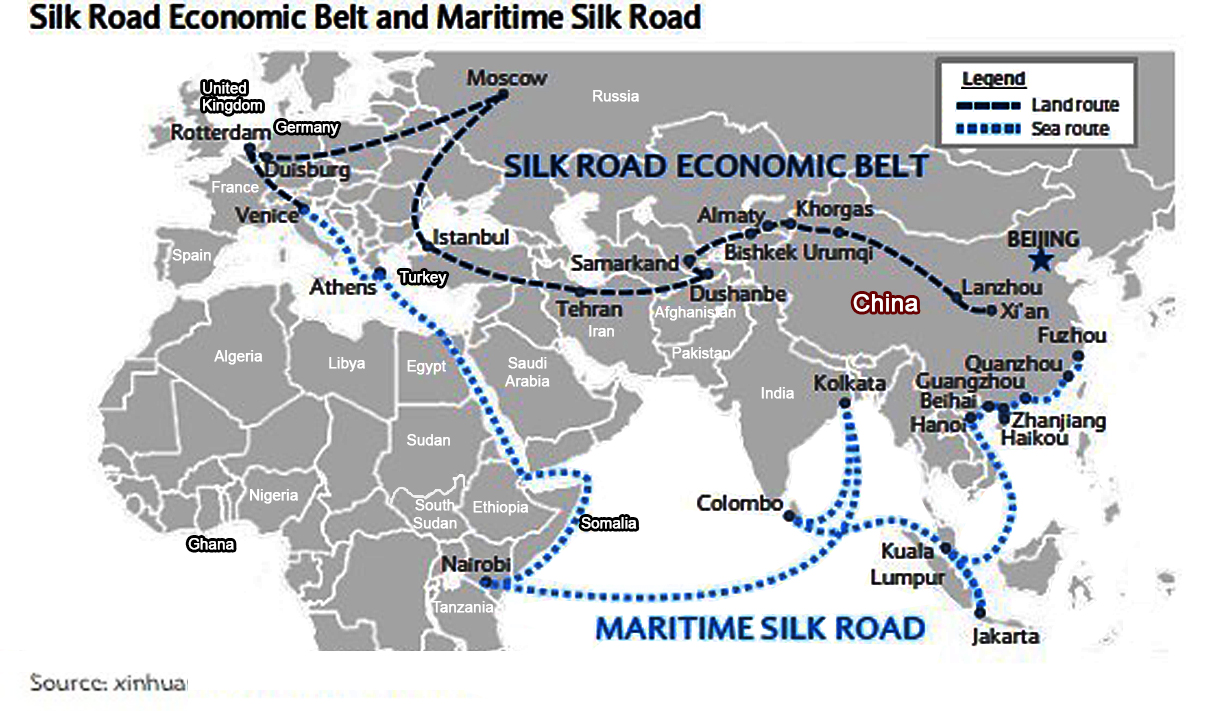Washington Makes Biggest Geopolitical Blunder Since 1776
Many thought it could never be done, but Washington has actually managed to unite the East against a faltering, aimless West
680
SHARES
|
MORE: POLITICS
We're still recovering from Marine Le Pen's 60 Minutes interview with Anderson Cooper.
We guess that Cooper doesn't have a lot of practice interviewing adults. "So it goes".
In particular, we were struck by how Le Pen perfectly understood what's at stake for Europe as Washington continues to beat its anti-Russia bongos:
Cooper: You don’t believe Russia is a threat to Europe?Le Pen: I don’t believe that at all. I think that’s a big scam.Cooper: The invasion of Ukraine…Le Pen: I’ll tell you what the danger is for Europe. It’s carrying out a Cold War against Russia, and pushing Russia into China’s arms. THAT'S the threat to Europe.
Maybe it seems self-evident to our geopolitically-savvy readership, but we imagine that the vast majority of Americans are completely unaware that the New Cold War hasn't just ruined relations with Russia for the foreseeable future — it has also driven Moscow into the arms of Beijing.
More than anything else, Washington's anti-Russia saber-rattling and "Asia pivot" has ensured that the West's economic and political stranglehold on the rest of the world is coming to a swift end.
Back in July 2015, the Asia Times reported on the latest geopolitical musings of Shen Dingli, a leading voice in Chinese foreign policy debates.
Shen underscored that “China is a realistic country, and it is aware of the power of leverage… China’s wisdom since ancient times will not be lost in the current era.”
Summarizing Shen's view on China's growing partnership with Russia, the Asia Timeswrote:
There is no conceivable reason for China to spurn Russian overtures, which help to “counterbalance” the US-Japan alliance “against the backdrop of the accelerating” US re-balance strategy.Moscow is now using the same strategy to maintain its own national interests. If there is a way that can help it resist the threat from the U.S. while preserving a certain degree of mutually beneficial collaboration with Washington, cooperation with Beijing is the way forward… Indeed, the Kremlin’s “turn to the East” is only a contingency plan, which was basically put into effect under pressure… Russia’s collaboration with China is more a matter of expediency, instead of a “strategy’”.
In other words, following the Ukraine crisis and a barrage of sanctions and vitriol from the West, Moscow saw Beijing not as a trusted ally and partner, but as a "strange bedfellow" in the name of political and economic expediency.
It's not that relations with China were bad before the West went ballistic — it's simply that for a long time Russia had focused its energy on integrating itself with Europe. (Think back to Putin's proposal for a Russia-EU free trade zone spanning from "Lisbon to Vladivostok".)
For instance, China's ambitious infrastructure initiatives for the region were, until very recently, met with a certain level of suspicion by Moscow. After all, a Chinese-led "New Silk Road" across Eurasia would force Moscow to surrender much of its regional economic and political influence in Central Asia:
Russia has dominated this region since the Soviet era and has most recently formed an Eurasian Economic Union (EEU) with Kazakhstan, Belarus and Russia as its founding members. When China announced the Silk Road initiative, Russian officials saw it as a challenge to Russia’s regional integration project, the EEU. China has tried to convince Russia that these two projects can be connected and developed simultaneously in a manner of mutual cooperation. In addition, the sanctions imposed by the West have pushed Russia closer to China in President Vladimir Putin’s attempt to re-orientate Russian interests from the West to the East.
During President Xi’s visit to Moscow in May 2015, the two countries signed 32 deals, a key point of which was the decision made by Putin and Xi to link their countries’ key integration projects: the Russian-led EEU and China’s Silk Road Economic Belt. Alexander Gabuev, a senior researcher at the Moscow Carnegie Center, said that “the agreement was the result after ‘a painful internal discussion’ on the Russia side”, indicating that Russia will give its dominant economic position in Central Asia to China, while maintaining its military and security in the region.
But Washington has somehow managed to accomplish the impossible: Our American friends have miraculously vaporized much of the tension and suspicion inherent in a Russia-China alliance.
The reason? Because it's perfectly clear to both countries that they need to work together to counter Washington's ambitions in the region.
There's plenty of evidence to suggest that China and Russia's partnership is no longer one of expediency — and instead a long-term geopolitical strategy to ensure the economic and national security of both countries.
Recently, Beijing announced that it would begin to "coordinate" foreign policy with Moscow — which we're already seeing on issues involving Syria. Cooperation on opposing Washington's THAAD anti-missile systems in Korea is another recent example.
On the economic front, the list of initiatives would reach the Moon and back. Let's just say it's "ambitious":


As one of our cherished commenters, "Greg", pointed out:
So congratulations, Washington. You are the glue that binds China and Russia together.
Many thought it could never be done, but Washington has actually managed to unite the East against a faltering, aimless West
Hands down the most disastrous, counter-intuitive geopolitical blunder since 1776.
Now please clap.




Geen opmerkingen:
Een reactie posten